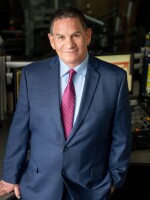Many polling locations were packed on the Central and South Coasts Tuesday, as voters weighed in on the recall election. Voters at one Conejo Valley polling place spent more than an hour in line, but say it was important to them to have their say.
But, the polls were closed for less than an hour when the results became clear. Governor Gavin Newsom didn’t have to wait until the 11 p.m., or 10 p.m. newscasts to make his victory speech. It was over before 9 p.m.
The votes are still being counted, but the recall effort is on track to lose statewide by a roughly two-thirds margin.
In Ventura County, voters turned it back by a 60% to 40% margin.
Santa Barbara County said no to the recall by a 65% to 35% margin.
And, San Luis Obispo County voters rejected it 59% to 41%.
The final election night results will change slightly during the next few days, as more mail-in ballots are counted.
Longtime California Lutheran University Political Science Professor Dr. Herb Gooch says he isn’t surprised by the results. "This is very much what I thought," said Gooch. "I was never in doubt he would be able to return the recall back."
Will the recall hurt his career? "One could argue that," said Gooch. "But, the race for a second term (he is up fore reelection in 2022) is all but predetermined. It's hard to imagine anyone raising money to run against him. Long run, though, it's an interesting question."
Republican talk show host Larry Elder was by far the largest vote-getter of the 46 candidates seeking to replace the California governor, getting nearly half of the votes. Coming in second was Democrat Kevin Paffrath of Ventura, the investor and YouTube star who got about 10% of the vote.
"Larry Elder shows that he owns the Republicans, not (Kevin) Faulkner, not (John) Cox, but he didn't show that he can draw independents. Why is anybody going to put money behind him," said Gooch.
Gooch says the recall effort came out of people upset with the state’s efforts to control COVID-19 through efforts like business shutdowns and operating restrictions. But, he says it morphed into other issues. On the Democratic party side, the ads in the closing weeks of the campaign painted the recall as a Republican power grab.
In his victory speech, Governor Gavin Newsom sounded like he was talking to a national audience, issuing a warning about what he called Trump-styled politics.
"The former President put out, saying this election was rigged. But, democracy is not a football," said Newsom. "We may have defeated Trump, but Trump-ism is still alive in this country."
It’s the second time in the last two decades there’s has been a recall effort targeting the governor’s office. In 2003, Democratic Governor Gray Davis was recalled, and was replaced by Republican Arnold Schwarzenegger.
The recall election is going to be an expensive exercise in democracy. The Secretary of State says that the total cost of the recall election could top $300 million. Ventura, Santa Barbara, and San Luis Obispo counties will be reimbursed by the state for the millions they spent conducting the election.



